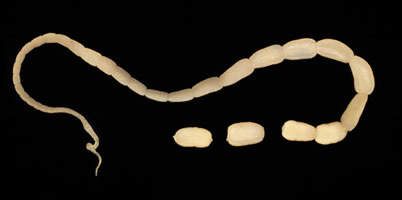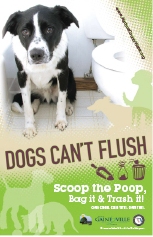Interactions
Being a parasite, Dipylidium caninum benefits from its hosts in which it harms. The scolex of
Dipylidium caninum will attach to the small intestines of a vertebrate host to feed off of
and cause some unpleasant symptoms such as diarrhea to persist
for the host.

Humans are effected by Dipylidium caninum in various ways. First, if they're a pet owner, their pet such as a cat or dog could become infected with Dipylidium caninum thus the owner would need to attend to treating their pet. Also, although rare, humans are capable of acquiring the disease themselves. Usually more present in children, humans could ingest an infected flea from their pet dog or cat.
PREVENT INFECTION!
Back to Home
